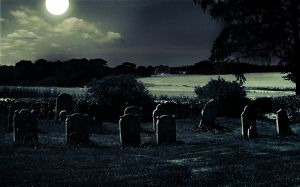Halloween and it's History

Introduction
Halloween (or Hallowe'en) is an annual holiday observed on October 31. It has roots in the Celtic festival of Samhain and the Christian holiday All Saints' Day, but is today largely a secular celebration. The word Halloween is first attested in the 16th century and represents a Scottish variant of the fuller All-Hallows-Even ("evening"), that is, the night before All Hallows Day. Up through the early 20th century, the spelling "Hallowe'en" was frequently used, eliding the "v" and shortening the word. Although the phrase All Hallows is found in Old English (ealra hįl?ena męssedę?, the feast of all saints), All-Hallows-Even is itself not attested until 1556. Source. Wikipedia, the free encyclopedia
Halloween originated among the Irish Celts, Scots and Anglo-Saxons in Britain long before the Christian era.Originally called Samhain, it was a time when they believed the division between the worlds of the living and the dead became very thin and when ghosts and spirits were free to wander as they wished. The name "Halloween" is a shorter form for the Gaelic name All-hallow-evening.
Pope Boniface IV instituted All Saints' Day in the 7th century as a time to honor saints and martyrs, replacing the pagan festival of the dead. In 834, Gregory III moved All Saint's Day to Nov. 1, thus making Oct. 31 All Hallows' Eve ('hallow' means 'saint').
Celts, selts, or Kelts, kelts. A name given to people speaking the Celtic branch of the Indo-European language family. It is properly used to refer to a language group,not to a race, since the Celts consisted of tribes of mixed racial origins. The Celtic languages are diveded into two main branches,Gaelic (or Goidelic) and Brythonic (sometimes called British). Gaelic includes Irish, Scottish and Manx, which are spoken in parts of Ireland and Scotland and on the Isle of Man. Brythonic includes Welsh and Breton.
The origin of the Celts is unknown, but they are associated with the La Tene culture of the late Iron age in Europe. Between 500 and 1B.C. they expanded from a center in France (ancient Gaul) and Germany over most of Europe and Britain. In 100B.C. they were found in 8 main divisions - In Gaul, Britain, Belgic Gaul (Belgium), Spain, Italy, the Alps, and the valley of the Danube. They were barbarians and their raids were the terror of the ancient world.
Halloween. An old Celtic tradition
Halloween has been celebrated in one form or another for over 2000 years, but how has it evolved over time to be- come the holiday we know today. What are the Origins Of Modern Halloween? It is certainly true that the festival of 2000 years ago bears little resemblance to the one we know today, but even in it's oldest form it still contains elements we will recognize.
Ancient Times
The original source of what has evolved into our modern Halloween holiday can be traced back over 2000 years to the Celts that lived in and around Ireland and England. They celebrated their new year on November 1st as they regarded this to be the end of summer and the beginning of the cold dark winter period, a time that to the Celtic people was strongly associated with death.
They believed that the night before the new year the boundaries between the living and the dead realm was at its weakest, and the spirits of the dead could roam the land of the living. On this night they held the pagan celebration Samhain pronounced sow-in, it literally means summers end.
During this celebration they would gather together in fields and build large fires called bon fires that were supposed to ward away the spirits of the dead. They would also dress up in animal skins and wear animal masks and tell each others fortunes. At the end of the night each would take embers from the fire to light their homes fire grate, they believed that a fire lit from the Samhain bon fire would keep them safe from death throughout the winter period.
Roman Occupation
When the Romans came to Britain in 40AD they occupied the Celtic lands, and over the next 400 years of their rule the Roman festivals of Feralia, when Romans celebrated the passing of the dead, and Pomona a celebration for the goddess of the same name, grew to replace Samhain. The goddess Pomona is the roman goddess of fruit and trees often associated with apples, the incorporation of this into Samhain is thought to be why the tradition of bobbing for apples has become associated with the Halloween celebration.
Christian Influences
By the 7th century Christianity had spread to the Celtic lands and it was during this time that Pope Boniface IV founded all saints day, to be held on the 1st day of November. It was a day that celebrated all the saints that didn't already have a day associated with them. The choice of day was no accident and is widely believed to be an attempt by the church to replace the pagan holiday with a christian one, much as they did with Easter (pagan festival of Ostara/Eostre), and Christmas (pagan festival of Yule). In the language of the time all saints day was called Alholowmesse, this evolved over time into all - hallowmas and then finally all hallows. The evening before this celebration was called all hallows eve which became Halloween.